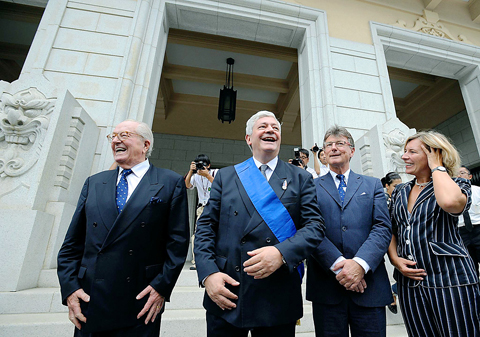French nationalist Jean-Marie Le Pen and other European right-wing politicians paid a visit yesterday to a Japanese shrine that has drawn outrage for honoring war criminals.
Le Pen, leader of the far-right French National Front and Adam Walker of the British National Party said they were making the visit, which comes a day ahead of the 65th anniversary of the end of World War II, to pay respect to those who died in war.
“What counts is the will that we had to honor those who have fallen for defending their country, whether they are Japanese, or any soldiers of the world, we have the same respect for them,” Le Pen told reporters.

PHOTO: EPA
Le Pen is known for his anti-immigrant and extremist views. He shocked France when he qualified for the second round of the 2002 presidential race, which Jacques Chirac eventually won.
The visit to Yasukuni, an ornate Shinto shrine in downtown Tokyo, was arranged by the International Conference of Patriotic Organisations, which brought together right-wing parties from eight European countries with members of a Japanese ultranationalist group called the Issuikai.
Yasukuni honors Japan’s war dead, including convicted war criminals. Pacifists and victims of Japanese aggression, such as China and the Koreas, say it glorifies Japan’s past militarism.
The visit by Le Pen and others may also anger some former prisoners of war in those countries being represented by the right-wing groups.
Tens of thousands of British, Dutch and other European soldiers and civilians were captured by the Japanese Imperial Army as it swept across Europe’s former Asian colonies at the beginning of World War II. Thousands were executed, tortured and starved to death in Japanese prisoner-of-war camps.
When asked about his visit, Walker said: “I’m honoring the dead. I am here to honor the dead — heroes that have died for their country.”
In the past, visits to Yasukuni by Japanese politicians have provoked outrage from China, South Korea and neighboring Asian countries.
Some lawmakers, as well as hundreds of regular Japanese whose relatives and friends died as soldiers in World War II, are expected to visit Yasukuni today to mark the end of World War II.
However, Japanese Prime Minister Naoto Kan and his ministers are expected to shun the visit — the first time all members of a Japanese Cabinet will stay away.
Kan’s liberal Democratic Party defeated the long-reigning conservative Liberal Democrats for the first time in decades in last year’s parliamentary elections.
Earlier this week, Kan apologized to South Korea for its colonial rule and the suffering Japan caused the Korean people, and expressed hopes for a partnership.
Japanese leaders have repeatedly apologized for wartime aggression against its Asian neighbors, including a 1995 apology from a leftist-leaning prime minister that marked the 50th anniversary of the end of World War II.

AIR SUPPORT: The Ministry of National Defense thanked the US for the delivery, adding that it was an indicator of the White House’s commitment to the Taiwan Relations Act Deputy Minister of National Defense Po Horng-huei (柏鴻輝) and Representative to the US Alexander Yui on Friday attended a delivery ceremony for the first of Taiwan’s long-awaited 66 F-16C/D Block 70 jets at a Lockheed Martin Corp factory in Greenville, South Carolina. “We are so proud to be the global home of the F-16 and to support Taiwan’s air defense capabilities,” US Representative William Timmons wrote on X, alongside a photograph of Taiwanese and US officials at the event. The F-16C/D Block 70 jets Taiwan ordered have the same capabilities as aircraft that had been upgraded to F-16Vs. The batch of Lockheed Martin

GRIDLOCK: The National Fire Agency’s Special Search and Rescue team is on standby to travel to the countries to help out with the rescue effort A powerful earthquake rocked Myanmar and neighboring Thailand yesterday, killing at least three people in Bangkok and burying dozens when a high-rise building under construction collapsed. Footage shared on social media from Myanmar’s second-largest city showed widespread destruction, raising fears that many were trapped under the rubble or killed. The magnitude 7.7 earthquake, with an epicenter near Mandalay in Myanmar, struck at midday and was followed by a strong magnitude 6.4 aftershock. The extent of death, injury and destruction — especially in Myanmar, which is embroiled in a civil war and where information is tightly controlled at the best of times —

China's military today said it began joint army, navy and rocket force exercises around Taiwan to "serve as a stern warning and powerful deterrent against Taiwanese independence," calling President William Lai (賴清德) a "parasite." The exercises come after Lai called Beijing a "foreign hostile force" last month. More than 10 Chinese military ships approached close to Taiwan's 24 nautical mile (44.4km) contiguous zone this morning and Taiwan sent its own warships to respond, two senior Taiwanese officials said. Taiwan has not yet detected any live fire by the Chinese military so far, one of the officials said. The drills took place after US Secretary

THUGGISH BEHAVIOR: Encouraging people to report independence supporters is another intimidation tactic that threatens cross-strait peace, the state department said China setting up an online system for reporting “Taiwanese independence” advocates is an “irresponsible and reprehensible” act, a US government spokesperson said on Friday. “China’s call for private individuals to report on alleged ‘persecution or suppression’ by supposed ‘Taiwan independence henchmen and accomplices’ is irresponsible and reprehensible,” an unnamed US Department of State spokesperson told the Central News Agency in an e-mail. The move is part of Beijing’s “intimidation campaign” against Taiwan and its supporters, and is “threatening free speech around the world, destabilizing the Indo-Pacific region, and deliberately eroding the cross-strait status quo,” the spokesperson said. The Chinese Communist Party’s “threats